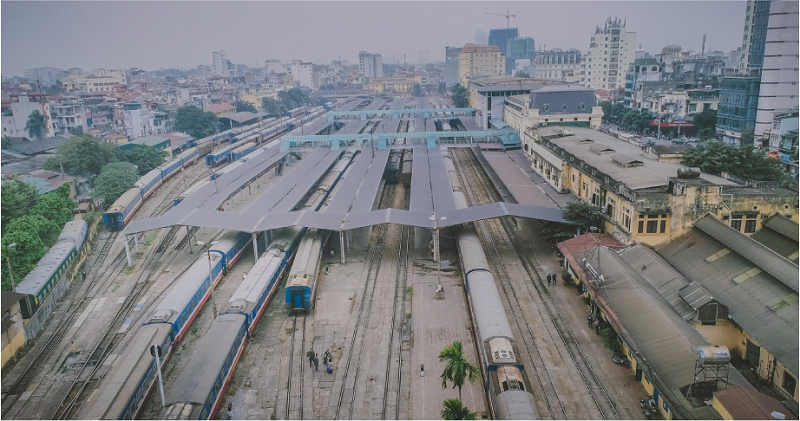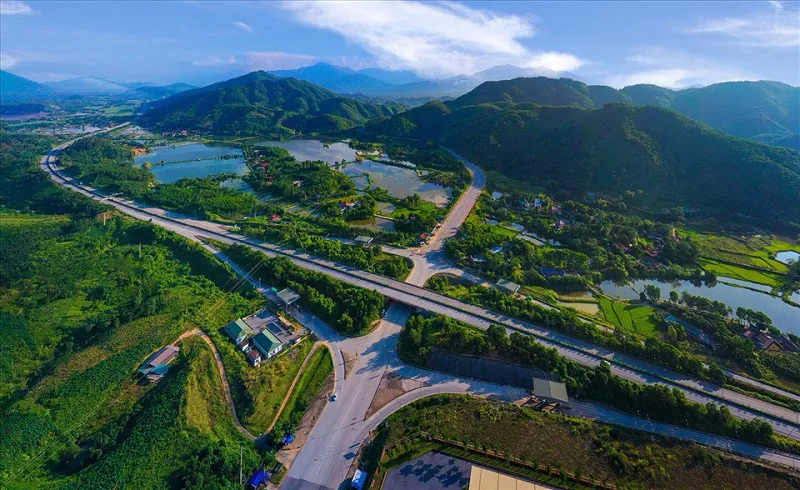Hanoi as the heart of northern logistics and transportation
A network of railways and highways makes it convenient to travel between Hanoi and other provinces and cities in the north.
As the central hub of the northern region, Hanoi has what it takes to become a leading logistics hub. Digital transformation is key for the capital's logistics sector to tap this potential.
According to the city's Department of Transport, Hanoi is well connected to all provinces and cities in the north, with nearly 23,300 km of roads and highways.
| Inside Hanoi Railway Station, where trains depart for other provinces and cities in Vietnam and abroad. Photo: Trung Nguyen/The Hanoi Times |
Neuralgic highways starting from Hanoi are the Phap Van-Cau Gie highway to the south, the Noi Bai-Lao Cai highway to the north and northwest regions, and the 5B highway connecting the city to the east and northeast of the country.
Hanoi's network of railways and waterways is also extensive, reaching out to other provinces and cities in the north.
The capital is well-connected with other provinces and cities nationwide and with Southeast and Northeast Asia, said Nguyen The Hiep, Deputy Director of the Department of Industry and Trade.
However, there are still bottlenecks hindering the transport and logistics network from being fully leveraged, said Do Viet Hai, Deputy Director of Hanoi's Department of Transport.
"Incomplete infrastructure, traffic congestion, and urban flooding make logistics activities inconvenient, increase transportation costs, and reduce the quality of services," Hai said.
He said the growth of online trade has led to a boom in delivery services, causing traffic congestion, noise, and environmental pollution. "Hanoi authorities should soon apply digital solutions to improve the quality of logistics services in the city and avoid such issues."
He also recommended that city authorities adopt digital solutions in urban planning and management of transportation infrastructure, especially the use of Building Information Model (BIM) in the design, construction, and operation of such infrastructure.
He urged local authorities to push up the implementation of the smart transportation plan, which focuses on using smart devices to monitor traffic and regulate the flow of vehicles.
Other solutions include drafting a regulation to manage transport companies and encourage them to improve their operations and launching a goods trading platform to minimize the number of empty trucks, thus reducing pollution and traffic congestion, Hai added.
Hanoi's role in Vietnam-China socio-economic relations
Hanoi holds a special place in Vietnam-China social and economic relations, especially between Vietnamese localities and China's Yunnan Province.
With an extensive network of roads, railways and waterways, Hanoi can become the hub for distributing goods imported from China to other provinces and cities in the north.
| The IC12 exit on the Noi Bai - Lao Cai highway. Photo: laodong.vn |
The National Assembly Resolution 81/2023/QH15 of January 9, 2023 on the Master Plan for National Development until 2050 defines Hanoi as one of the two economic hubs of the country, so it is necessary to equip it with new highways, railways, and another airport to become the country's transshipment hub.
The priority is to develop an economic corridor from Lao Cai Province to the cities of Hanoi, Haiphong and then to Quang Ninh Province. Such a scheme will make it possible to utilize the internal strength of the northern region and boost economic and trade relations between Vietnamese localities and China's southwestern provinces, including Yunnan.
According to the deputy director of Hanoi's Department of Industry and Trade, Hanoi will build two new inland container depots (ICDs) in Gia Lam and Hoai Duc districts, another one in Gia Lam district, a post and mail delivery center in Me Linh district, and other logistics centers to improve the citywide logistics network.
Hanoi's municipal and local authorities will also seek further cooperation with domestic and international logistics enterprises and associations to turn the capital into the country's logistics hub, he said.
High-quality human resources will also be developed in anticipation of logistics development, Hiep said at a panel discussion on transportation and logistics in the economic corridor between China's Yunnan Province and Vietnam's Lao Cai, Hanoi, Haiphong, and Quang Ninh earlier this week.
Strong rail network key to boosting economic corridor
With its punctuality and high capacity for freight transportation, rail transport should be the key to boosting economic and trade activities in the North.
Experts and government officials at the panel discussion argued that Vietnam should further develop the national railway network to meet international standards in terms of track gauge.
At present, Vietnam's railways are mostly 1 meter wide, including the line built to connect Lao Cai province to Quang Ninh province. Only 6% of them are 1.435m wide as required by international standards.
Because of the difference in track gauge between Vietnam and China, it often takes longer and costs more to transport goods to Hanoi, as imports have to be unloaded from Chinese freight trains and loaded onto Vietnamese ones at the border.
Nguyen Huy Hoang, a specialist from the Transport Development and Strategy Institute under the Ministry of Transport, suggested that the Vietnamese government and provincial authorities quickly upgrade the Lao Cai-Hanoi-Haiphong-Quang Ninh railway to 1.435m gauge.
The idea was welcomed by the Yunnan Provincial Transportation Department and the Yunnan Provincial Reform and Development Committee. The Chinese officials said the wider gauge would facilitate better trade between Yunnan and Vietnamese localities.












